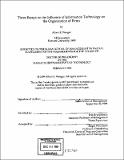Three essays on the influence of information technology on the organization of firms
Author(s)
Wenger, Albert E. (Albert Edmund), 1967-
DownloadFull printable version (13.53Mb)
Alternative title
3 essays on the influence of information technology on the organization of firms
Advisor
Erik Brynjolfsson.
Terms of use
Metadata
Show full item recordAbstract
The three papers in this thesis are devoted to understanding how Information Technology (IT) has and will continue to affect the organization of firms: -- IT and Firm Size The anecdotal evidence on changes in firm size is mixed. While! spin-offs and downsizing suggest a trend towards smaller firms, the recent wave of mergers points to a trend towards larger firm. The paper analyzes US Business Census data to examine trends in firm size empirically and relate them to the use of IT. This exploratory study shows that the trends vary considerably across sectors: IT appears to be associated with a trend towards smaller firms in traditional manufacturing industries and a trend towards larger firms in information-based industries. The paper suggests a possible explanation by considering the combined effect of multiple mechanisms through which IT may affect firm size. -- IT and Hybrid Organizations There appears to be a shift away from both large bureaucratic organizations and individually comp??ting entrepreneurs to "hybrid organizations." For instance, horizontal and networked organizations attempt to combine the initiative shown by entrepreneurs with the coordination achieved in bureaucracies. The paper models a tradeoff between initiative and coordination encountered in organization design. Improved IT is shown to relax this tradeoff, so that hybrid organizations can achieve both more initiative and more coordination. The results from the model are used to analyze the organizational design issues faced by hybrid organization. A case study of Siemens Nixdorf Information Systems (SNI) is used to illustrate the managerial implications. -- Costly Communication IT has dramatically improved the ability to communicate information in organizations. The effects of improved communication are difficult to analyze in traditional economic models since these generally assume fret. Communication. Previous economic theories of communication have substantial shortcomings. The paper proposes a novel approach based on the concept of communication protocols from information theory. It is shown how optimal protocols can be characterized. The properties of optimal protocols are then used to analyze the effect of improvements in communication on the standardization of organizational communication and on the allocation of decision rights.
Description
Thesis (Ph.D.)--Massachusetts Institute of Technology, Sloan School of Management, 1999. Includes bibliographical references.
Date issued
1999Department
Sloan School of ManagementPublisher
Massachusetts Institute of Technology
Keywords
Sloan School of Management